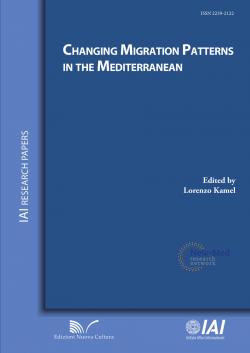Changing Migration Patterns in the Mediterranean
Questo volume è stato scritto da rinomati studiosi della rete di ricerca New-Med con l'obiettivo di promuovere il dibattito accademico e politico sul mutare degli scenari migratori nel Mediterraneo e nei paesi che si affacciano su questo mare. Viene presa in esame l'evoluzione nel corso degli ultimi decenni delle migrazioni verso l'Europa mediterranea, e analizzata la dimensione storica, demografica, sociale, psicosociale, economica e politica di questi fenomeni. I capitoli conclusivi presentano una valutazione del ruolo dell'Unione europea e alcune proposte per una politica migratoria europea di ampio respiro.
Parte dei testi raccolti nel presente volume sono stati originariamente pubblicati nella collana IAI Working Papers (aprile-ottobre 2015), nell'ambito della rete di ricerca New-Med. Volume presentato alla conferenza "Radicalization in the Mediterranean Region: Old and New Drivers", Ankara, 14 dicembre 2015.
-
Dati bibliografici
Roma, Nuova Cultura, novembre 2015, 214 p. -
Numero
22 -
ISBN/ISSN/DOI:
978-88-6812-596-7
Contributors
Abbreviations
Introduction, by Lorenzo Kamel
1. Continuity and Change in Youth Migration Patterns from the Mediterranean, by Ummuhan Bardak
1.1 Diversity of migration patterns across the AMCs
1.2 The irresistible attractiveness of the ‘migration idea’ to the youth
1.3 Modest but consistent international student flows
1.4 Changing profiles of migrants: young, single, less-educated men?
1.5 Evolving destinations: developments in Europe and the Gulf and their policies
1.6 Has the Arab Spring increased emigration?
1.7 What are the main migration outcomes?
Policy conclusions and recommendations
2. European Muslims: Caught between Local Integration Challenges and Global Terrorism Discourses, by Anna Triandafyllidou
2.1 European Muslims
2.2 Tensions over Islam in different European countries
2.3 Distinguishing between problems of integration and jihadist terrorism
Conclusions
3. Turkey’s Evolving Migration Policies: A Mediterranean Transit Stop at the Doors of the EU, by Ahmet İçduygu
3.1 The evolution of Turkey as a transit country
3.2 Turkey-EU relations: the evolution of Turkey’s migration policies
Conclusions
4. Migrations Through and From Libya: A Mediterranean Challenge, by Mattia Toaldo
4.1 Changing patterns of migration and migration control through Libya
4.2 The (illegal) economics of migration in Libya
4.3 Libya's ungoverned spaces
4.4 Migrations from Libya and within Libya
4.5 De-securitising migration policy
5. Morocco’s Experience of Migration as a Sending, Transit and Receiving Country, by Mehdi Lahlou
5.1 Moroccan migration policy: first step, the Law of 02/03
5.1.1 Overall framework
5.1.2 The Law of 02/03
5.1.3 Institutional framework
5.2 Moroccan migration policy, second period: lower migration
5.3 Moroccan migration policy, third step: managing economic crisis and “Arab spring” effects, under human rights pressure
Conclusions
6. Israel’s Policies toward Asylum-Seekers: 2002-2014, by Galia Sabar and Elizabeth Tsurkov
6.1 Israel's immigration regime: a brief introduction
6.2 Challenging Israel's migration regime: the arrival of international migrant labourers
6.3 African asylum-seekers enter Israel: major milestones
6.3.1 Numbers
6.3.2 Procedures and policies
6.4 Between Israel and the UNHCR, between conditional release, temporary protection and RSD
6.5 The struggle over the 1954 Prevention of Infiltration Law
6.6 Asylum-seekers’ perceptions of Israel's policies: between hopelessness and struggle
Conclusions
7. Gender and Mobility across Southern and Eastern European Borders: “Double Standards” and the Ambiguities of European Neighbourhood Policy, by Sabrina Marchetti and Ruba Salih
7.1 Gender and migration
7.2 Women migrants to the EU from the East and South
7.3 Algerian women in France
7.4 Moroccan women in Spain
7.5 Ukrainian women in Poland
7.6 Moldovan women in Italy
Conclusions
8. Migration and Refugee Governance in the Mediterranean: Europe and International Organisations at a Crossroad, by Sarah Wolff
8.1 An EU-driven and risk-averse migration and refugee governance
8.2 Mediterranean partners and state-driven regional initiatives
8.3 UNHCR and IOM: framing an alternative debate on refugees and migration in the Mediterranean
8.4 IOs’ challenges regarding shaping and influencing EU and Mediterranean policies
8.5 Frontex and IOs: an example of good practice?
8.6 Future prospects and recommendations for IOs
Bibliography
Tema
Tag
Contenuti collegati
-
Evento09/12/2015
Radicalization in the Mediterranean Region: Old and New Drivers
leggi tutto -
Pubblicazione19/10/2015
Migration and Refugee Governance in the Mediterranean
leggi tutto -
Pubblicazione04/09/2015
Turkey's Evolving Migration Policies
leggi tutto
- 1
- 2
- 3
- 4
- seguente ›
- ultima »




